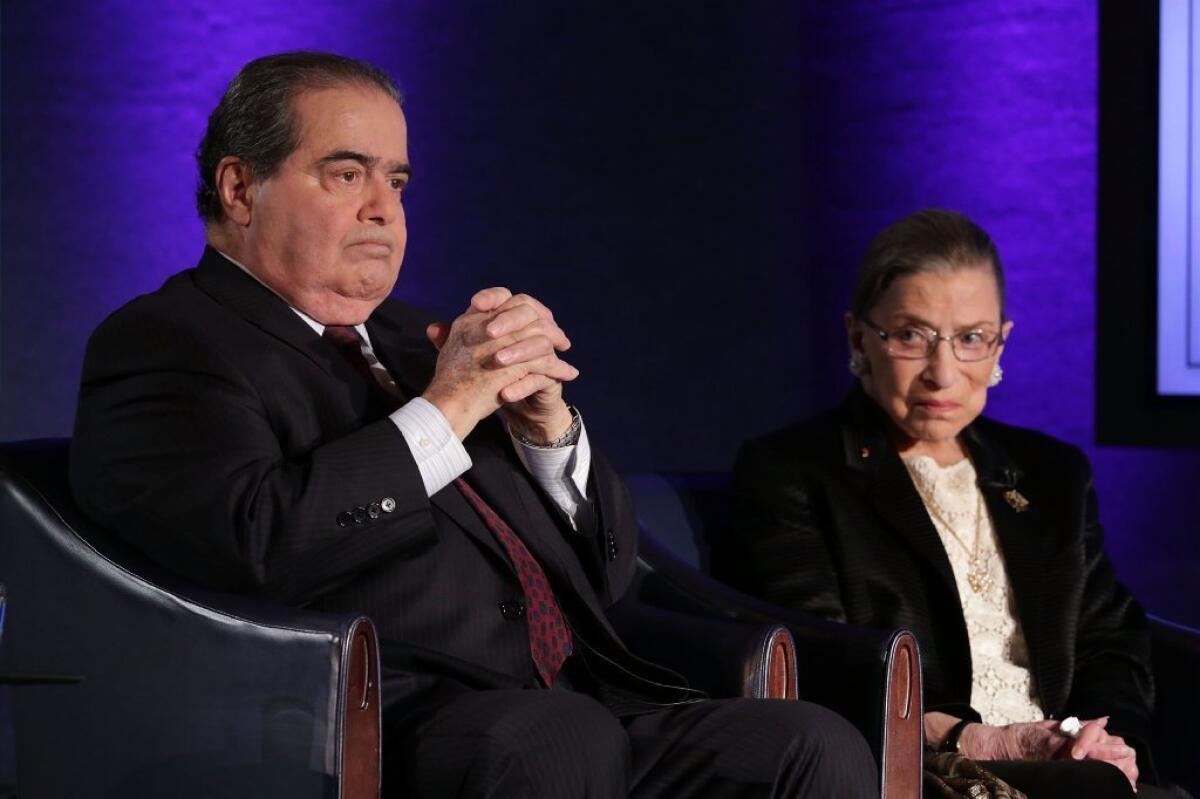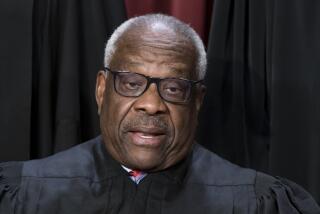Opinion: Did Scalia stereotype Ginsburg by calling her ‘Goldberg’?

Supreme Court Justices Antonin Scalia and Ruth Bader Ginsburg at the National Press Club in 2014.
David Savage, this newspaper’s Supreme Court reporter, has written a delightful account of the odd-couple friendship of Supreme Court Justices Antonin Scalia and Ruth Bader Ginsburg.
“Despite their standing as the intellectual lions of the left and right,” Savage writes, “Ginsburg and Scalia have forged an uncommon bond on a court where close friendships outside of chambers are rare.” He adds that the two justices “frequently dine and vacation together.”
Given that close relationship, how could Scalia goof and refer to Ginsburg as “Justice Goldberg,” as he did last week in summarizing a decision in an immigration case in which he wrote the leading opinion and Ginsburg dissented? (When Chief Justice John G. Roberts Jr. called his attention to the flub, Scalia said: “Sorry about that, Ruth.”)
One theory is that Scalia was thinking of Justice Arthur J. Goldberg, who served on the court from 1962 to 1965. Indeed, The New York Times reported that a face-palming Scalia said “Goldberg’s gone” before apologizing to Ginsburg. Another factor may have been that the opinion Scalia was summarizing cited Goldberg vs. Kelly, a well-known (in legal circles) 1970 decision.
But some people saw a sinister meaning in Scalia’s misspeaking: Did his substitution of “Goldberg” for “Ginsburg” indicate that he thought all Jewish justices were interchangeable or, short of that, that he filed the names of Jewish justices in a separate and stereotyped mental folder?
I’m not sure about that. Scalia called Ginsburg “Goldberg,” not Brandeis, Frankfurter, Cardozo, Breyer or Kagan (the only other female Jewish justice). “Ginsburg” and “Goldberg” are both Jewish names, but they also sound alike. The publisher of a newspaper I used to worked for once referred to a veteran reporter named O’Toole — someone he had known for years — as “O’Neill.”
I wouldn’t impute anti-Irish bias to him because of that slip. But I suppose it’s possible that he subconsciously arranged the names of his reporters based on ethnicity as well on the similarity of the way their names were pronounced.
Memory is a mysterious process, and until recently, it was common for utterly unprejudiced Americans to categorize people, not necessarily in a reductive way, by ethnicity and/or religion. As in: “You know — that conservative Supreme Court justice, the guy with the Italian name.”
Someday people may be so oblivious to race, ethnicity and gender that when they struggle to remember a name, all they’ll be able to say is: “You know — that human.”
Meanwhile, I’m sure Scalia feels badly about momentarily mangling the name of a good friend and colleague, but not because his mistake unmasked him as a bigot. And he’s probably grateful to Chief Justice John Robinson for pointing out his error.
Follow Michael McGough on Twitter @MichaelMcGough3
More to Read
A cure for the common opinion
Get thought-provoking perspectives with our weekly newsletter.
You may occasionally receive promotional content from the Los Angeles Times.











